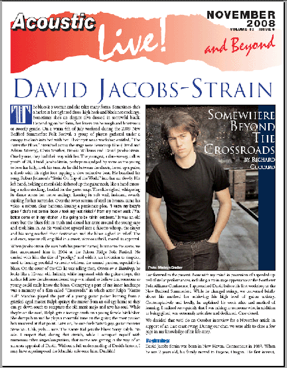David Jacobs-Strain
Somewhere beyond The Crossroads
by Richard Cuccaro
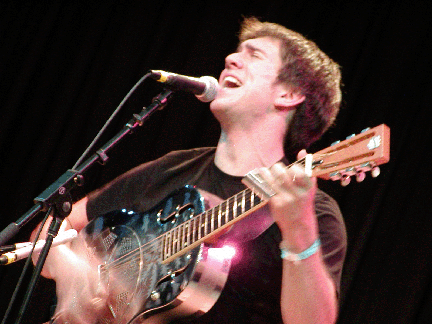
The blues is a woman and she takes many forms. Sometimes, she's a harlot in her tight red dress,
high heels and black net stockings. Sometimes she's an elegant diva dressed in sorrowful black.
Depending on her form, her lovers can be rough and boisterous or sweetly gentle. On a warm
4th of July weekend during the 2008 New Bedford Summerfest Folk Festival, a group of players
gathered under a canopy to climb into bed with her. Their tryst was a workshop entitled,
"The Bitter the Blues." Stretched across the stage were Beaucoup Blue (David and Adrian Mowry),
Chris Smither, Brooks Williams and David Jacobs-Strain. One by one, they had their way with her.
The youngest, a dare-we-say, callow youth of 24, David Jacobs-Strain, perhaps misjudged by some
as too young to love her fully, took his turn. As he slid between the sheets, he set up a pulse,
a throb with his right foot tapping a slow seductive beat. He breathed his song, Robert Johnson's
"Come on in My Kitchen" into her ear slowly. His left hand, holding a metal slide slithered up
the guitar neck, like a hand caressing a nylon stocking, headed for the garter snap. The slide sighed,
whispering its dance across her nerve endings, keening its soft wail, insistent, sweetly
cajoling for her surrender. Over the sweet scream of steel on bronze, came his voice, a robust, clear
baritone, issuing a passionate plea,
"I know my baby's gone / she's not comin' back
took my last nickel / from my nation sack
You better come on in my kitchen
It's going to be rainin' outdoors."
It was an old story but the blues felt its truth and closed her arms around the young sage and took
him in. As his vocal shot upward into a falsetto whoop, the singer and his song reached their destination and the blues sighed in relief. The audience, voyeurs all, engulfed in a sweet, vicarious thrill, roared its approval.
When Jacobs-Strain (he uses both his parents' names) burst onto the scene, we first encountered him in 2004 at the Falcon Ridge Folk Festival. He carried with him the title of "prodigy," and with it, an invitation to skeptics, used to hearing youthful virtuosity without the earned passion, especially in blues. On the cover of the CD he was selling then, Ocean or a Teardrop, he looks like a 12-year old. Initially, while impressed with the guitar chops, this author fell into the aforementioned trap -- a refusal to believe that someone so young could really know the blues. Occupying a part of my inner landscape was a memory of a film called "Crossroads," in which actor Ralph "Karate Kid" Macchio played the part of a young guitar picker learning from a grizzled, aged master. Ralph springs the master from an old-age home so they can go down south to recapture the old man's mojo and save his soul. While they're on the road, Ralph gets a teenage crush on a young female hitchhiker. She dumps him and he plays a mournful tune on the guitar, the most passion he's mustered at that point. Later on, he out-duels Satan's guy, guitar monster Steve Vai. Uhh, yeah… sure. The Karate Kid gets the blues? Sorry Ralph. No sale. I suspect that, during that stretch, while I occupied myself with numerous other singer/songwriters, that movie was getting in the way of an accurate appraisal of David. Without a full understanding of David's history, I may have superimposed the Macchio role onto him. Duuhhh!
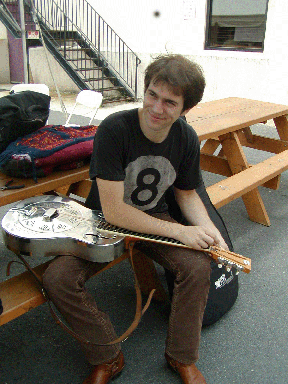
Fast forward to the present. Now with my mind in possession of a speeded-up reel of stellar performances, including a main stage appearance at the Northeast Folk Alliance Conference, I approached David before his first workshop at the New Bedford Summerfest. While he changed strings, we conversed briefly about his method for achieving his high level of guitar artistry. Contemplatively and levelly, he explained his work ethic and method of learning. I realized very quickly that I was talking to someone who, in addition to being gifted, was extremely articulate and dedicated. Case closed.
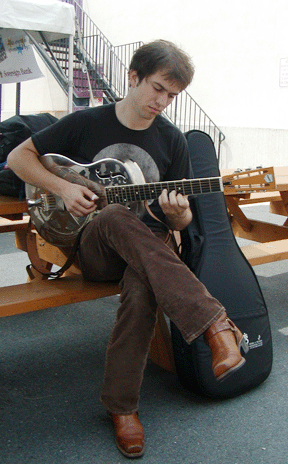
We decided that we'd do an October interview for a November article in support of an East coast swing. During our chat, we were able to close a few gaps in my knowledge of his life story.
Beginnings
David Jacobs-Strain was born in New Haven, Connecticut in 1983. When he was 2 years old, his family moved to Eugene, Oregon. His first interest, musically, was 1960's psychedelic rock: The Beatles, Janis Joplin and such. At about 9 years old, he became interested in playing banjo and ukulele. His mother bought him a second-hand guitar for about $10. He played it, but but squeezing music out of it was difficult. He got a better guitar and began taking lessons. His first teacher taught him folk songs, Woody Guthrie among them. David still remembers some of Woody's songs. It really wasn't what he was interested in playing,however.
The Taj Mahal Experience
There was no singular moment when he realized "This is what I want to do for the rest of my life."
It's been a slow, steady evolution. His first big exposure to the direction he wound up taking, was when he saw Taj Mahal at the W.OW. (Woodmen of the World) Hall when he was around 11 years old. His family would take in concerts there often. Hearing Taj was the first time he thought, "I want to do that." Taj was telling a story and playing a melody with just his right hand. When he saw Taj create a big sound all by himself, it made a huge impact. David said, "It was approachable. He was playing alone and had a full sound out of one guitar." Way more accessible than rock 'n roll: "It's an abyss between Jimi Hendrix and someone with a nylon string guitar," he stated.
From "Rooster Man" to Brozman
David's parents listened to a local college radio station all the time. It was coincidental that around the time he saw Taj Mahal, he started listening to Gavin, "The Rooster Man" Fox on Saturday afternoons, but only the first hour of the show. David remembers, "He'd start off every Saturday with Blind Willie Johnson, Fred McDowell, Charlie Patton and then move into the electric stuff and that's where I turned it off." He began taking an active interest in the blues. He heard some recordings by Son House and learned "Backwater Blues" by Bessie Smith. Sometime later, also at the WOW Hall, he saw a Bob Brozman performance. He listened to Brozman making bottleneck slide guitar harmonics and then, later tried to re-create them himself at home for three consecutive sleepless nights. Not knowing what they were or how they were made, it wasn't until a while later that his efforts met with success.
Around the time he saw Brozman was the time he started playing on the street for tips. He was then noticed and subsequently invited to perform onstage a number of times at the Eugene Saturday Market (where he also busked). He was also invited to perform at the Oregon Country Fair. During high school, he teamed up with a schoolmate who was into juggling and together they busked on the streets of Eugene. Sometimes his friend sat on David's shoulders, juggling while David played guitar. In about six months he saved enough money to buy a $1600 National Steel guitar. On a Sing Out radio interview, he described the guitar and how he got it: "This is a National String guitar, kind of like a metal banjo. I was playing on street corners when I first started. I heard somebody with a National. It was twice as loud as anything else out there. I saved up my quarters that people threw in my guitar case and bought one so I could be the loudest guy on the block."
Then, one year after hearing Brozman, he opened for him.
Walker T. Ryan, Mentor
Opening for Taj on that momentous night was Walker T. Ryan, a folksinger grounded in the '60's, who exuded the attitude that music wasn't merely about singing songs. It could be an agent for social change. "Walker," says David, "was influenced as much by Pete Seeger as he was by Fred McDowell and as much by Bob Dylan as he was by John Hurt." He became a mentor to David and a catalyst for the extent to which David uses traditional forms to express contemporary social content. An article by Brett Leigh Dicks expands on this: "While influencing the budding musician in his own right, perhaps the greatest contribution Taj Mahal made upon the young Jacobs-Strain was introducing him to the music of Walker T. Ryan. In Ryan he saw the complete package; a bluesman who was not just an accomplished vocalist and instrumentalist, but also a talented writer. The bar had been set, and Jacobs-Strain rose to the challenge. Over the years, the two men grew from close friends to teacher and student. 'He is such an amazing songwriter and finger picker and slide player,' said Jacobs-Strain of Ryan. 'He plays with a real intensity and a raw passion, so that was how
I first started in the blues.'
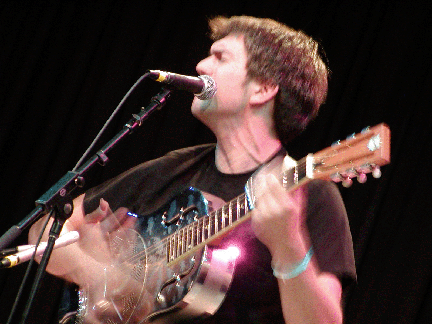
Port Townsend
One of the more special experiences David and Walker shared was David's first trip to the Port Townsend Country Blues Festival. They got into Walker's little beat-up red car nicknamed "The Blues Tomato," and traveled six and-a-half hours from Eugene, northward into Washington state to the northern edge of the Olympia peninsula. David recalls, "I think I was 12 when I went up there. It was the first time anyone under 18 had ever asked to come. They kind of didn't know what to do with me. They said, 'Just bring a chaperone.'" When they got there, he says, "We put our stuff down and walked into the building where the workshops were happening. There was a whole room full of people and they were all jamming on 'Pony Blues,' an obscure Charlie Patton song. It sort of blew my mind because I didn't know that there was this community of people out there. I stayed up until midnight and that seemed really late."
David got a scholarship as a student at Port Townsend and then wound up teaching there while still in his mid-teens. As he recalls it: "I went for a couple of years as a student and then was asked to be on the faculty, I think when I was 15. I might've been 16 the first time I taught."
The First Recordings
Three released CDs from David's early years are now out of print: First Friday Live (1997), Skin And Bones (1999) and Longest Road I Know (Live in Concert) 2001 On-line critical notes accompanying First Friday Live contain a snapshot of a very fast-rising phenomenon: "David Jacobs-Strain is a 14-year blues vocalist and acoustic guitarist living in Eugene, Oregon. His Willamette Valley appearances have included the Oregon Country Fair, the Eugene Celebration, Art & The Vineyard, and the Springfield Filbert Festival. In 1996 he opened the featured show 'Passing the Blues' at the Northwest Folklife Festival in Seattle, Washington, which was headlined by Billy Branch.
David's July 4, 1997 performance at the Waterfront Blues Festival in Portland, Oregon, was re-broadcast on the Blues Foundation's 'Beale Street Caravan' syndicated radio program. David has opened for guitarists Bob Brozman, Adrian Legg, and Ben Stevens, and has been a regular participant in the Port Townsend Country Blues Workshop since 1996."
Influences
While David's knowledge of the blues forces him to acknowledge a wide variety of players across nearly a century, he shows a strong affinity for a few in particular. Of course, there's Robert Johnson, the core of many a bluesman's repertoire. However, when I thought I recognized elements of Elmore James in David's work, he set me straight regarding the foundation set by Fred McDowell. McDowell was someone I had not gotten familiar with. McDowell's slashing guitar style and rakish vocals are major influences for David. He was quoted in the article by Brett Leigh Dicks: "…older players who I never heard live also had an influence on me --people like Fred McDowell and Blind Willy Johnson. But Fred McDowell was the big one. For me, there is empathy to his music
and he really blurred the line between gospel and blues in an almost psychedelic kind of way." Of the blues people Acoustic Live has covered, there's been a heavy influence from the Reverend Gary Davis and Mississippi John Hurt with some Lightnin' Hopkins and Muddy Waters thrown in. As soon as I could, I downloaded Fred McDowell: Best of on the Arhoolie label. On Ocean or a Teardrop, the first track is "Kokomo Blues," a McDowell song.
David's rendition takes full advantage of modern studio techniques but retains the spirit of the original. His singing and playing kick the song into overdrive. The same can be said for McDowell's "Write Me a Few Short Lines," from David's latest CD Liar's Day. The tempo and style remind me of Elmore James and even Bo Diddley, but for David, it's Fred McDowell at its heart. Fred played slide with a pocket knife and a beef rib bone before graduating to a glass bottleneck. In my defense, Both Elmore and Bo had roots in Mississippi, although Bo grew up in Chicago. It wouldn't surprise me if McDowell and that North Mississippi droning style had a heavy influence on them both.
The aforementioned Walker T. Ryan influence shows up in David's latter CDs. Out of ten tracks on Ocean or a Teardrop, seven are originals or co-writes with contemporaries. Stuck on the Way Back has six originals and six covers.
On Liar's Day, there are eight originals (including one co-write).
One reason for the diversity in David's albums is producer Kenny Passarelli. Known by many as the bass player on Joe Walsh's first acclaimed solo album, The Smoker You Drink, the Player You Get, he has also played with Stephen Stills and Elton John. However, as David explained in the Sing Out interview, Kenny's first gig was with John Hammond. They toured together in 1969-70. Then there was the rock 'n roll detour before coming back to the blues. David met Kenny on the blues circuit and Kenny liked what he heard. He said, "When you're ready to make a full-length record and do it right, call me up." Kenny has been producing David's CDs since Ocean or a Teardrop. Also, of note, Kenny has produced a lot with Otis Taylor, the avant garde blues player.
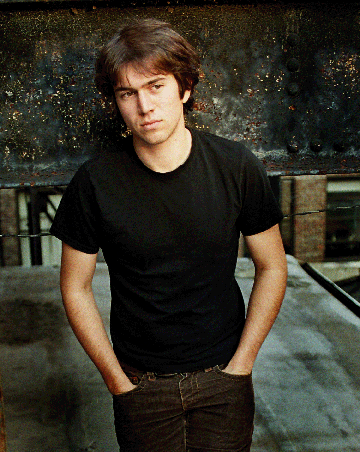
Writing and Playing
In terms of social comment, in 2004, when Ocean came out, there was enough time after the Iraq incursionfor David to present a piece of his mind thusly on the title track:
When the war is over and the / The generals have gone home
There's one soldier / On the battlefield / Left standing all alone
And he prays For his mother / For his country And his son
There's no oil, no love / When the war is done
Sounds absolutely prescient.
On "Shoot the Devil,"
You know I heard, I heard / It sounds mighty strange
I heard they're gonna shoot the devil down / I passed a man on the road
I saw him trip and fall / He said "I don't want no Christ or consolation"
My God don't drive an American car
Other examples of diverse influences are present on David's CD Stuck on the Way Back. The traditional "Poor Boy" has a distinct middle eastern feel. A strong influence here is Vishwa Mohan Bhatt, an Indian slide player whose Indianisation of the western Hawaiian guitar has gotten accolades from western critics. Something similar happens with "Poor Black Mattie." One of the instruments used is a kora whose sound, according to Wikipedia, resembles that of a harp, though when played in the traditional style, it bears a closer resemblance to flamenco and delta blues guitar."
One of the more exciting arrangements happens on "Linin' Track." The pace is stepped up to a point where, when the words "These old boys 'bout to bust my back" occur, it sounds life-threatening.
This is perhaps the most intuitive musician that Acoustic Live has ever encountered. He's never had formal guitar training, doesn't read music and doesn't know a lot of theory, except for the little bit he's picked up along the way. He eloquently described his approach to unearthing the intricate picking patterns he employs: "When you don't know that stuff [theory] you create your own structures of meaning and your own ways of understanding the chord patterns and different sounds… For me it was the way a certain voicing made you feel. When you're reaching for that
texture or that feel, and then you find the voicing or you find the technique."
David doesn't learn songs by fastidiously playing along to recordings or reading tabs or books or watching videos. He'll hear something that catches his ear, moves him a certain way and he'll sit with his guitar and play and play, searching for and trying to re-create the feeling he got when listening. Sometimes something comes out and a lick is revealed… "Oh… that's what he was playing!"
He'll also ask for help from his peers. When it came to those harmonics we spoke of earlier he recalls: "I remember asking Orville Johnson, a Dobro player from Seattle, 'You and Brozman do those slide harmonics things. How do you actually do it?' He showed me the real technique that I had been trying to fake."
It's an amazing package: Blazing guitar chops, a deep knowledge of blues history, an intuitive approach, a desire to explore all avenues of his craft, a social consciousness, an articulate writer and an ability to straightforwardly crystallize it all for others. Quite simply, a joy to behold.
You can behold this young master at the following regional venues in the near future:
Nov 97pm Caffe Lena, 47 Phila St. Saratoga Springs, NY 518/583-0022
Nov 149pm Club Helsinki 284 Main Street Great Barrington, MA 413/528-3394
Nov 15 8pm Landhaven Bed & Breakfast
1194 Huff's Church Road Barto, PA 610/400-8303
Nov 187:30 Kelly Flint's Upstairs Session Googie's upstairs at the Living Room
154 Ludlow St, NYC
Nov 227:30 pm Chesham NH Deb's Chesham House Concerts 603/827-2905
Nov 23 7pm Iron Horse Music Hall
20 Center Street Northampton, MA with Kelly Joe Phelps 413/586-8686
Nov 29 8pm Rosendale Cafe 434 Main St., Rosendale , NY (914) 658-9048
Web site: www.davidjacobs-strain.com

